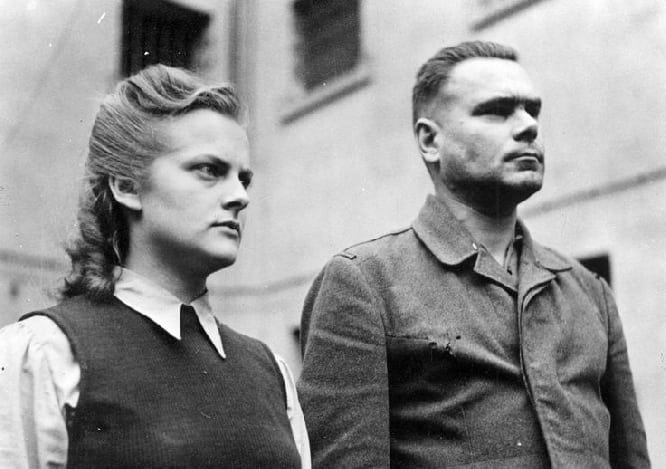These extracts are taken from the personal memoirs of a British 6th Airborne Paratrooper, Albert Childs, and range between 1938 & 1948. They are selected as stories that remind us of The Greatest Generation and the role of the British Paratrooper.
Extract from – The Greatest Generation: Diary of a 1st & 6th Airborne Paratrooper (1940-1950)
The Beast of Belsen
A week or so later my company had been pulled out of the advancing line to perform the military policing duties we had been originally trained for. On around 17 April I received orders to go to a place called Belsen to collect some prisoners of war and so I gathered a section of my platoon and picked up a three-ton personnel carrier.
Sergeant Ball was the section leader and I was commander of 3rd Platoon. It was rumoured that I was to be given the Regimental Sergeant Major’s rank and Ball was hoping to take over my rank and platoon in the near future.
Between us we drew rations and set out for Bergen Belsen in fairly good moods. The fighting was virtually over for us by then and policing duties were light work compared to what we had been doing over the previous few years. But that mood soon changed when we reached the concentration camp.
I don’t know what I was expecting but I didn’t imagine anything like that. I was sick to my stomach with what I saw there, including pits full of dead bodies that looked like skeletons. Those who were still alive looked just the same. It was hard to tell the living from the dead.
There were a number of British paratroopers already there, with some Canadian soldiers, who were all giving the prison guards a pretty hard time. They got beaten up very badly. Every one of us was disgusted and very upset with what we found. We were also very angry and that showed.
I made myself known to the officer in charge but my only real thought was to get out of there as quickly as possible and away from that stench. I was given a list of prisoners and at the top was the name Joseph Kramer, the camp commandant who was later known as the Beast of Belsen.
And a beast he was too, although by the time I locked him up he was a broken one. The liberating troops had given him and his assistant Irma Grese (one time mistress of Josef Mengele) a particularly hard time. But I didn’t care.
I handcuffed them, along with another six of their guards and took them with an armed escort to a place called Celle, where they were handed over to the Military Provost Staff Corp and locked up.
Kramer and Grese were hanged for war crimes in the December of that year. They were lucky not to have been beaten to death by the paratroopers.
The following week our division had passed through Luneburg, Hamburg and was approaching Lubeck, up on the Baltic Sea and it was there that I caught up with my company again.
However, a few days later I was sent back to Hamburg to transport another high profile Nazi to the jail. This time it was the German Foreign Minister Joachim von Ribbentrop who had been arrested by a Belgian citizen near the city as he was trying to flee.
He was carrying a letter addressed to Prime Minister ‘Vincent’ Churchill which blamed Britain for the war and for the rise of Bolshevism in Europe. Von Ribbentrop was later a defendant at the famous Nuremburg Trials following which he was sentenced to death.
Such was his seniority within the Nazi Party he was the first of them to actually be executed.
I knew the 3rd Parachute Brigade, along with the rest of the 6th Airborne, was heading for Wismar up on the Baltic Sea and that would be our final destination. Leaving Hamburg I headed north again to catch up with my company and by this time the roads were full of soldiers who had surrendered and been disarmed.
They had also been joined by civilians, or refugees, who were heading west with whatever they could carry.
They knew, as we did, that the Soviets were heading in from the east and it seemed that everybody was trying to get as far to the western side of Germany as possible. They didn’t want to be around when the Red Army arrived in their town or village.
And, as it turned out, for good reason too. We had no such worries. In fact, we were supposed to link up with them at Wismar but the sheer numbers of people on the narrow roads made it slow going for the brigade.
But our jeep was not held up behind the main column and that meant we arrived in Wismar around the end of April, ahead of the rest of my company, and immediately set up a control point at a crossroads about three miles out of town.
This would be as far as the British army were going and would link up there with the forward elements of the Russians coming the other way. Soon afterwards I was approached by a leading paratrooper unit who told me about an old factory and warehouse in the town that had been used as a concentration camp, but the German guards had apparently deserted it.
So I dispatched half of my men, led by Sergeant Ball, to start erecting British Zone signs in what was to be our part of the town and then asked the paratroopers to come and support us at the factory. On the way they told me they were given the information by a Russian prisoner who had been held there.
The Greatest Generation: Diary of a 1st & 6th Airborne Paratrooper (1940-1950)
Albert Jack AUDIOBOOKS available for download here
The Greatest Generation extracts
